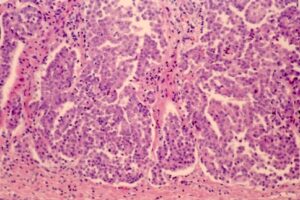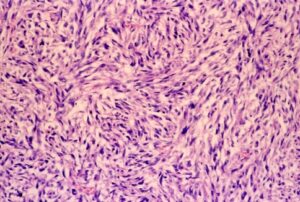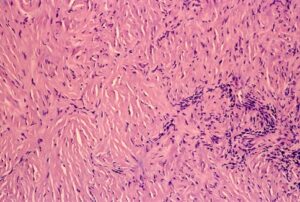Medical Centers / Mesothelioma Specialists / Mesothelioma Pathology
Mesothelioma Pathology
Pathology is the study of cells and tissues in the body and how they develop, metastasize, and possible treatments. Mesothelioma pathology studies the cells and tissues related to mesothelioma.
Get Free Mesothelioma Guide
Mesothelioma Histology
Mesothelioma pathology focuses on mesothelioma cells and how they form, spread, and interact within the body. Histology is one aspect of pathology that focuses on cell types and their functions. There are three primary types of mesothelioma cells: epithelioid, sarcomatoid, and desmoplastic. Pathology and histology help mesothelioma doctors form an accurate diagnosis and the most helpful treatment plan.
Pathology is a medical profession that studies diagnostic testing and treatment of various diseases. A mesothelioma pathologist studies the cause and origin of mesothelioma cells and tissues. After a thorough diagnosis by a pathologist, they then provide thorough mesothelioma treatment advisement.
Mesothelioma histology studies the function and structure of the body’s anatomy, including cells and tissues. Mesothelioma pathologists examine cancerous tissues and cells to make an accurate mesothelioma diagnosis. When looking at cancerous cells, specialists look for mesothelial markers such as epithelioid, sarcomatoid, and desmoplastic cell types.
Epithelioid Mesothelioma Cell Type
Epithelioid cells are one of the four types of the body’s natural cells and can be found on the skin’s surface and along the lining of hollow organs, blood vessels, and internal cavities. However, when the body is exposed to asbestos, these cells can become cancerous. Mesothelioma in epithelioid cells is the most common cell type of the disease and is found in 70 to 80 percent of mesothelioma patients.

Epithelioid mesothelioma pathology studies the shapes and layers of epithelial cells. Epithelioid cells often appear as cubed, columnar, and squamous shapes. These cells often form small clusters and can be round or oval and can be identified by their visible nuclei.
Sarcomatoid Mesothelioma Cell Type
Malignant mesothelioma pathology outlines three types of cells and sarcomatoid cells are the rarest type. Sarcomatoid mesothelioma accounts for 10 to 15 percent of pleural mesothelioma and 4 percent of peritoneal mesothelioma. These cells are aggressive and can be difficult to treat and they mimic healthy cells, leading to misdiagnosis and a poor mesothelioma prognosis.

A sarcomatoid cell is a combination of carcinoma and sarcoma cancer types. Sarcomatoid cells, also referred to as spindle cells, often appear oval in shape with a large nucleus with an unstructured formation in fibrous nodes or lesions. They are often identified as having an oblong, spindly shape. Additionally, these cells have a distant cell formation that allows them to metastasize quickly.
Desmoplastic Mesothelioma Cell Type
Desmoplastic cells are a rare mesothelioma variant that occurs in patients with sarcomatoid cells. According to pathology, of patients with sarcomatoid cells, 5 to 10 percent develop desmoplastic mesothelioma. Although this type of mesothelioma is rare, it is highly deadly.

Mesothelioma cytology characterizes desmoplastic mesothelioma as appearing dense and fibrous. However, desmoplastic cells do not have a defining pattern. Desmoplastic is difficult to diagnose and is not curable. Because desmoplastic mesothelioma cells are difficult to diagnose, patients’ cancerous cells metastasize rapidly and thoroughly for long periods. Therefore, the life expectancy of patients with desmoplastic mesothelioma is typically less than one year and has a low chance of remission.
Rarer Mesothelioma Cell Types
If you do not have one of the three common types of mesothelioma cells, you may have a rarer type of cell. Rare cell types can be more difficult to diagnose and treat, as doctors often have less knowledge of them. Medical professionals histologically classify some types of mesothelioma cells with more detail than epithelioid, sarcomatoid, and desmoplastic cells. There are several, rarer, types of mesothelial cells that histology has identified, including:
- Adenomatoid
- Benign
- Cystic
- Deciduoid
- Desmoplastic
- Heterologous
- Lymphohistiocytoid
- Papillary
- Small Cell
- Others
What is Mesothelioma Cytology?
Cytology is an aspect of mesothelioma pathology. Mesothelioma cytology studies cell types and is used to diagnose and screen for cancer. Cytologists examine cells by:
- Scraping or brushing the tissue’s surface
- Collecting body fluids
- Fine-needle aspiration
- Other types of tissue biopsies
Although similar, cytology is different from histology. Cytology typically examines a single cell type, whereas histology examines an entire block of tissues. Mesothelioma cytologists perform a pleural fluid examination where they remove cell samples from the pleura, or the area surrounding the lungs. They then use the cell sample to properly diagnose the lung condition.
What Are Mesothelioma Pathologists Doing Now?
Pathologists play a significant role in a mesothelioma diagnosis. Mesothelioma diagnosed by a pathologist is typically highly accurate. Additionally, these mesothelioma doctors help determine the best treatment plans. Mesothelioma specialists span the nation from Paul Sugarbaker in Washington, DC, to Robert Cameron in Los Angeles, CA.
A report from a pathologist is the most crucial part of a mesothelioma diagnosis as it provides a definitive diagnosis and describes the specific cells found in the tumor. This report assists medical professionals such as those that determine treatment. Other specialists part of a mesothelioma journey include:
- Medical Oncologists
- Radiation Oncologists
- Surgical Oncologists
- Dosimetrists
- Radiologist
- Pulmonologists Specialists
- Thoracic Surgeons
- Palliative Specialists
- Pain Management Specialists
Get in touch with a specialist at a top cancer mesothelioma medical center for excellent mesothelioma pathology. Mesothelioma Hub can connect you to a top mesothelioma doctor. Whether you have a mesothelioma diagnosis or want to know more about your mesothelioma cell type, Mesothelioma Hub can assist.
Mesothelioma Support Team
Mesothelioma Hub is dedicated to helping you find information, support, and advice. Reach out any time!
